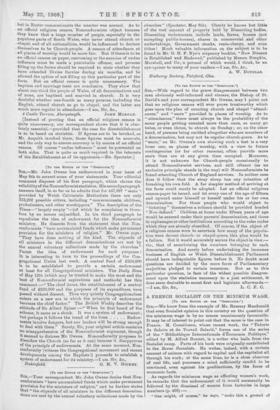tvo TAR EDITOR Or TH1 ErEOTATOR.1 SIR,—With regard to the
grave disagreement between two men obviously well-informed and sincere, the Bishop of St. David's and your correspondent Mr. Owens, may I point out that no religious census will ever prove trustworthy which goes upon the plan of counting church and chapel " attend- ances," and " seats " provided in places of worship. As to "attendances," there must always be the probability of the same people getting counted more than once, as ninny go twice, or even thrice, to church on Sunday ; or, on the other band, of persons being omitted altogether who are members of a denomination, but may not be regular chnrch.goers. As to "seats,' on Mr. Owens's own showing such a test is a very loose one, as places of worship, with a view to future contingencies (or for other reasons), often provide more seats than are at any given time occupied. Moreover, it is not unknown for Church-people occasionally to attend Nonconformist services, and still oftener (as no exclusive principle stands in the way) will Nonconformists be found attending Church of England services. In neither case does it follow that the stray sheep has any intention of forsaking his own fold. A far simpler method of arriving at the facts could surely be adopted. Let an official religious census-paper be issued, and let every one of the ago of fifteen and upward enter himself or herself under his or her own denomination. For those people who would object to " ticketing " themselves a column should be provided headed "Non-defined." Children at home under fifteen years of age would be entered under their parents' denomination, and those in orphanages or other institutions according to the rules under which they are already classified. Of course, if the object of a religious census were to ascertain how many of the popula- tion were devout church- or chapel-goers, this plan would be a failure. But it would accurately secure the object in view,— viz., that of ascertaining the numbers belonging to each denomination. And surely before undertaking the immense business of English or Welsh Dieesta,blisliment Parliament should have indisputable figures before it. No doubt most questions are decided by the mere force of Parliamentary majorities pledged to certain measures. But as to this particular question, in face of the widest possible disagree- ment upon the statistics necessary to a just settlement, it does seem desirable to count first and legislate afterwards.—










































 Previous page
Previous page